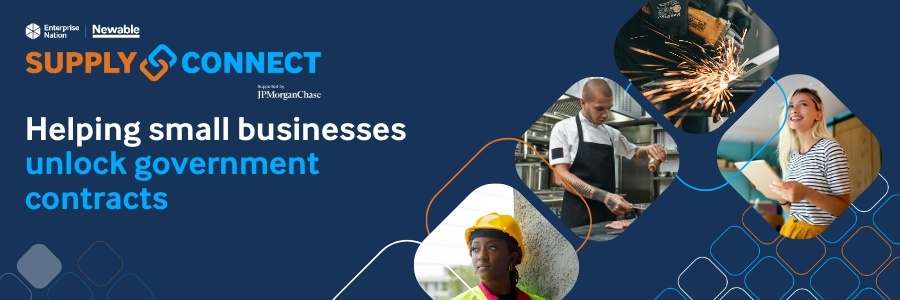From local to national: Teaming up with strategic suppliers
)
Posted: Tue 23rd Sep 2025
If you run a small business and have started exploring public sector procurement, you'll quickly discover that some contracts are simply too large or complex for a single smaller supplier to win outright.
That doesn't mean those opportunities are out of reach. Many of the biggest public sector projects are delivered through large companies that bring smaller firms into their supply chains.
These arrangements can be a powerful way for small and medium-sized enterprises (SMEs) to get a foothold in government work.
You're not competing head-to-head for the main contract, but you still gain valuable experience, contacts and credibility by delivering part of the work.
For some small businesses, this route proves to be the fastest and most effective way to enter the public sector market.
In this blog, we look at who these large government delivery partners are, why they matter and how you can position yourself to work with them. We'll also share practical tips for getting on their radar and becoming a trusted partner.
What is a strategic supplier?
A strategic supplier is a company that does a large volume of work with central government or provides services that are considered essential to the delivery of public services.
Because of their importance, they're managed more closely by the Cabinet Office and each one is assigned a "Crown Representative" – a senior contact who acts as the bridge between the company and government.
As of now, there are 39 companies in the strategic supplier group. They range from UK-based firms like BAE Systems, BT and Kier to international businesses such as IBM, Accenture and Thales.
Between them, they deliver everything from defence equipment and IT systems to building maintenance, consultancy and front-line staffing. Many hold multi-year contracts worth hundreds of millions of pounds.
Why do they matter to small businesses like mine?
The main reason is that these companies control a significant slice of public sector delivery.
The UK government has a stated aim to award more contracts directly to small businesses, but many of the largest projects still flow through these big players.
If you can secure a subcontract or supply arrangement with a strategic supplier, you're effectively working on public sector projects without having to tender for the main contract yourself.
That can be an easier way in – and it brings several benefits:
A steady flow of work as part of a long-running contract
Experience of meeting public sector standards and compliance requirements
The credibility that comes with being part of a major government project
Contacts in procurement and delivery teams who may open doors in future
It can also be less risky than trying to leap straight into large direct contracts. You're not carrying the full responsibility for delivery, but you still get valuable experience in public sector work.
What kind of work do strategic suppliers buy in?
Strategic suppliers don't deliver every element of their contracts themselves. They often subcontract parts of the work to smaller firms that have the right expertise, local knowledge or capacity.
This can include:
specialist technical skills they don't have in-house
niche products or services that are part of a larger solution
regional services to meet requirements around local delivery
activities that help them meet "social value" commitments, such as using local suppliers, supporting apprenticeships or reducing their impact on the environment
For example, a construction strategic supplier might subcontract local electrical or landscaping work. An IT supplier might bring in a smaller specialist to handle accessibility testing or cyber-security training.
VIDEO: Joining supply chains and mastering public contract bids
This webinar is designed to demystify two powerful avenues for growth: integrating into existing supply chains and successfully bidding for public contracts.
How to get noticed
Large organisations can be difficult to approach, but they are always on the lookout for capable partners who can help them deliver. The key is to target your efforts and make a clear, relevant offer.
1. Research who's winning what
Look at public sources like Contracts Finder or the Find a Tender service to see which strategic suppliers are active in your area of work.
Note what kind of contracts they're winning, who the buyers are and whether the work is national or regional. This helps you focus on companies that genuinely need what you offer.
2. Understand their supply chain needs
Many strategic suppliers publish information on their websites about how to become a supplier on their websites, including pre-qualification criteria, compliance standards and key contacts. Some even hold supplier days or run portals where you can register your details.
3. Use frameworks to your advantage
According to market data, strategic suppliers win a high proportion of their work through framework agreements.
If you can get on to the same frameworks, it puts you in their line of sight and can make it easier to be brought into bids or delivery teams.
4. Offer more than just your core service
Think about how you can help the strategic suppliers achieve their social value targets. This could be through local recruitment, environmentally sustainable practices or community engagement.
These elements are scored in public sector tenders, so if you can help them boost their score, you become more attractive as a partner.
5. Make contact at the right time
The best moment to approach a strategic supplier is often when a contract is due for renewal or shortly after they've won new work.
At renewal stage, they may be looking to refresh their delivery partners. Right after a win, they're often finalising their supply chain.
Building the relationship
Winning work with a strategic supplier isn't usually about one phone call or email. It's about building trust over time. This might mean:
meeting them at industry events or "meet the buyer" sessions
staying in touch with relevant news about your capabilities
offering to collaborate on smaller pieces of work to prove yourself
being reliable and responsive when opportunities arise
Once you're in their supply chain, focus on delivering well. A good track record will often lead to more work, both with them and with other buyers.
Is it worth the effort?
Not every SME will find a place in a strategic supplier's delivery chain, and that's fine.
If your offer is very niche, highly local or aimed at smaller-scale projects, you may be better going direct to public sector buyers or targeting contracts below the thresholds the big players usually chase.
But for many small businesses, partnering with a strategic supplier is one of the quickest ways to gain public sector experience.
You get to understand the compliance requirements, reporting processes and service standards that apply across government contracts – all without the burden of managing the whole project yourself.
That experience can then be a springboard to bigger opportunities in the future. It shows other buyers that you can meet public sector expectations, work as part of a structured delivery process and contribute to major projects.
People also enjoyed
Winning work with government: How to break into public procurement
Lunch and Learn: How to find and win public sector contracts
Lunch and Learn: Influencing decision-makers when bidding for contracts
Take your next step
Public sector contracts aren't just for the big players. With the government actively encouraging SMEs to take part, your business could be exactly what buyers are looking for. Register now
Get business support right to your inbox
Subscribe to our newsletter to receive business tips, learn about new funding programmes, join upcoming events, take e-learning courses, and more.
Start your business journey today
Take the first step to successfully starting and growing your business.
Join for free

